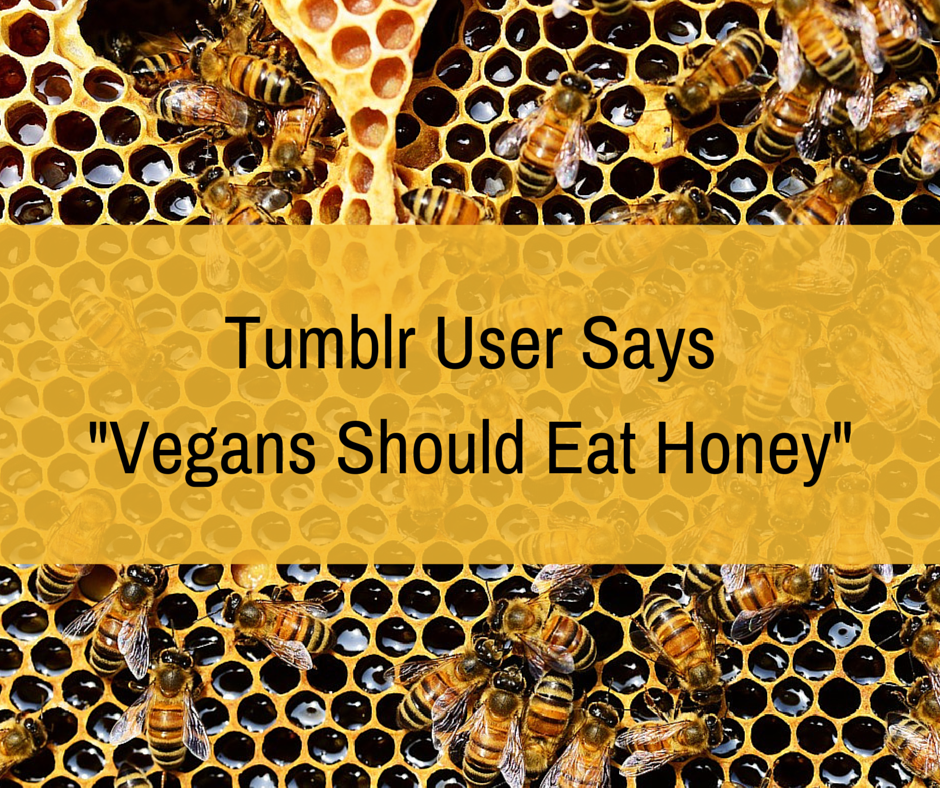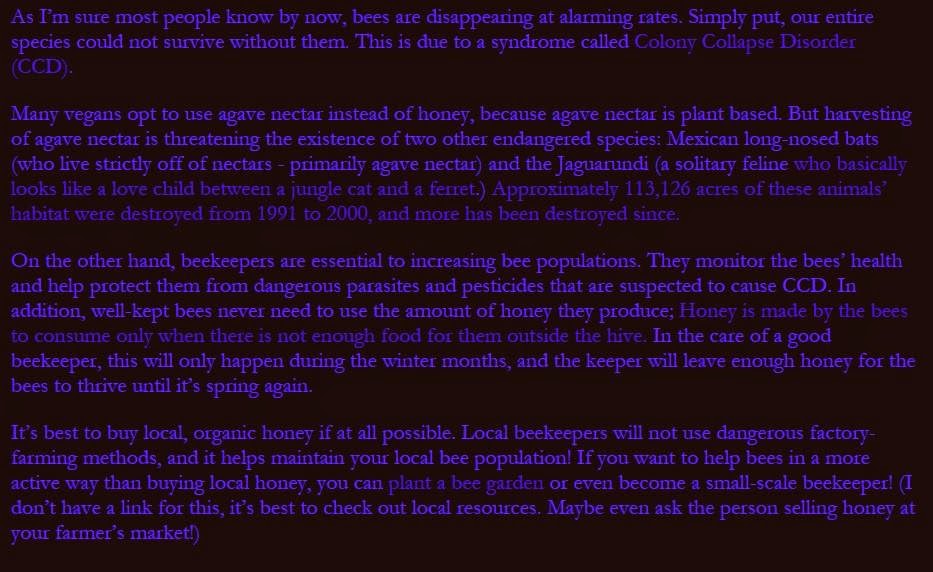
I don't know much about honey production. I don't know much about honey at all, because it's never really been included in my diet. I don't eat honey for two reasons: one, because it's an animal product, and I'm against the use of animal products; and two, because it tastes absolutely disgusting. I've never enjoyed eating honey.
What I do know is that, in general, honey isn't considered vegan. Avoiding animal products is a very important part of the vegan lifestyle, and honey, by definition, is an animal product. In that sense, it's not vegan and vegans shouldn't consume it.
But sometimes we have to look deeper. We have to think logically and practically about how to stop harming animals. Is it possible that honey production could be saving the bees rather than hurting them?
That's what Tumblr user itslitt3red (who is, according to their Tumblr page, vegan) has suggested. Here's a screenshot of the post in question, if you're interested:

If you can't read the text in the screenshot, here's a transcript:
"As I'm sure most people know by now, bees are disappearing at alarming rates. Simply put, our entire species could not survive without them. This is due to a syndrome called Colony Collapse Disorder (CCD).
Many vegans opt to use agave nectar instead of honey, because agave nectar is plant based. BUt harvesting of agave nectar is threatening the existence of two other endangered species: Mexican long-nosed bats (who live strictly off of nectars - primarily agave nectar) and the Jaguarundi (a solitary feline who basically looks like a love child between a jungle cat and a ferret). Approximately 113,126 acres of these animals' habitat were destroyed from 1991 to 2000, and more has been destroyed since.
On the other hand, beekeepers are essential to increasing bee population. They monitor the bees' health and help protect them from dangerous parasites and pesticides that are suspected to cause CCD. In addition, well-kept bees never need to use the amount of honey they produce; honey is made by the bees to consume only when there is not enough food for them outside the hive. In the care of a good beekeeper, this will only happen during the winter months, and the keeper will leave enough honey for the bees to thrive until it's spring again.
It's best to buy local, organic honey if at all possible. Local beekeepers will not use dangerous factory-farming methods, and it helps maintain your local bee population! If you want to help bees in a more active way than buying local honey, you can plant a bee garden or even become a small-scale beekeeper! (I don't have a link for this, it's best to check out local resources. Maybe even ask the person selling honey at your farmer's market!)"
It's a long piece of text, but it's worth reading. I found the arguments in this post interesting, but I wasn't really sure what to think because I know very little about honey production and beekeeping. This post outlines a variety of possible benefits of beekeeping but doesn't touch on any possible drawbacks. That's why I enlisted my Facebook page's audience to find out more.
My Facebook audience gave their educated opinions on this issue and I compiled their comments. In this post, I'll give a summary of opinions from both sides of the fence, allowing you to make your own decision about whether or not vegans should eat honey.
The responses from my Facebook audience were divided - some agreed entirely, some disagreed entirely, and some both agreed and disagreed with aspects of itslittl3red's post.
Those who disagreed with itslittl3red offered a variety of different arguments. The most popular comment, offered by Cem, said that veganism is about rejecting the commodity status of animals. In Cem's eyes, this is an standard of veganism that shouldn't be compromised under any circumstances. To quote them directly: "Sustainability is not a vegan concern since it's only about ethics."

Several other commenters appeared to agree with Cem's arguments. Debby, for example, noted that vegans don't use or harm animals unless it's necessary - honey bees included. Samuel offered a similar yet harsher argument, stating that bees are raped, gassed and killed in honey production.
Chelsea offers an interesting perspective: "Honey bees are not native to the U.S. anyway, and they compete with native pollinators (who are up to 2-3 times more efficient at pollinating), which is one more reason why the honey industry shouldn't be supported." To back up this claim, Chelsea cited this link,
Another reply to my Facebook post offered an opposing perspective. Cheyenne, who buys raw, local honey from a beekeeper, has no ethical hangups with this form of honey production. Cheyenne supports a local beekeeper and is happy with the way they treat their bees. This contrasts with Cem's argument which suggested that honey should never be used, regardless of how well the bees are treated.
"All things considered, honey is not vegan - at least not by definition."
Jane, who misses the taste of honey but doesn't eat it, sees honey as what it fundamentally is: bee vomit! Jane has a hive in their garden, but won't take any honey from the hive for one main reason. To quote Jane: "The bees aren't making it for me." Jane's comment reiterates what Cem said about rejecting the commodity status of animals (I should add veganism, as defined by Wikipedia, is indeed about rejecting the commodity status of animals - but is there more to it than this?).
Another commenter, Rhiannon, thinks itslitt3red has some valid points. They suggest a Netflix documentary called Vanishing of the Bees (2009), which details the sudden disappearance of honey bees from beehives around the world. According to this documentary, CCD (or Colony Collapse Disorder, the same disorder mentioned in itslittl3red's post) is noted as a primary cause of this disappearance, and pesticide use is said to contribute to CCD. According to itslitt3red's post, beekeepers help protect honey bees from these pesticides (in turn combating CCD).
All things considered, honey is not vegan - at least not by definition. In the most general terms, veganism is about rejecting the commodity status of animals and avoiding the use of animal products. In this sense, using honey goes against the 'rules of veganism'. On the other hand, it's important to think outside the box. It's a similar concept to my article about food wastage - there are other things that harm animals besides animal product use. Deforestation, habitat removal and pollution are some common examples. In my opinion, you should take all of this into account before you decide whether or not to use honey.
P.S: A big 'thank you' to everyone who responded to my Facebook post - I really appreciate your efforts!

